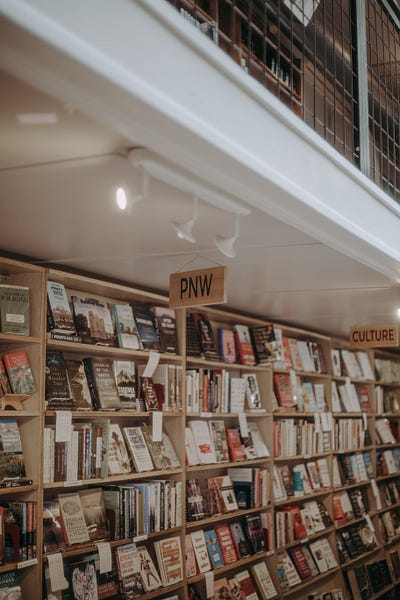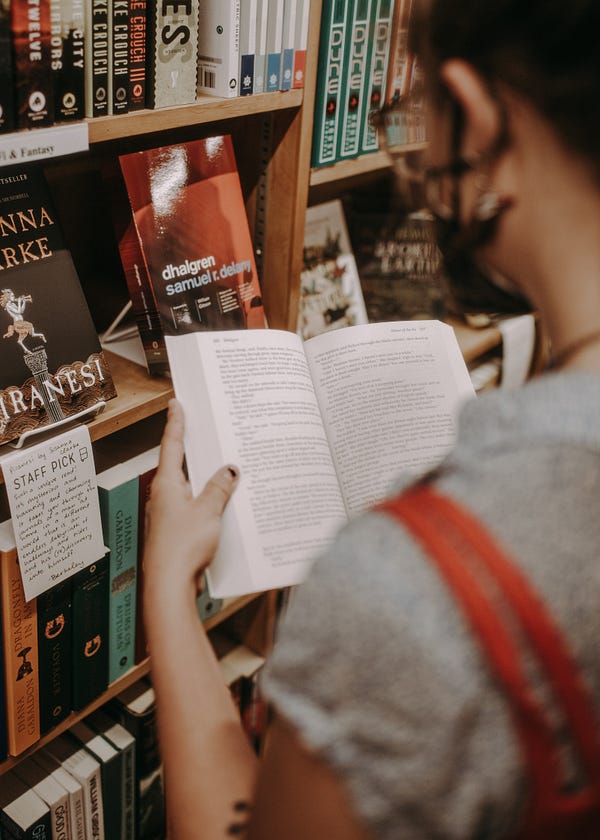Between the Lines: What it’s Like to Own a Bookshop
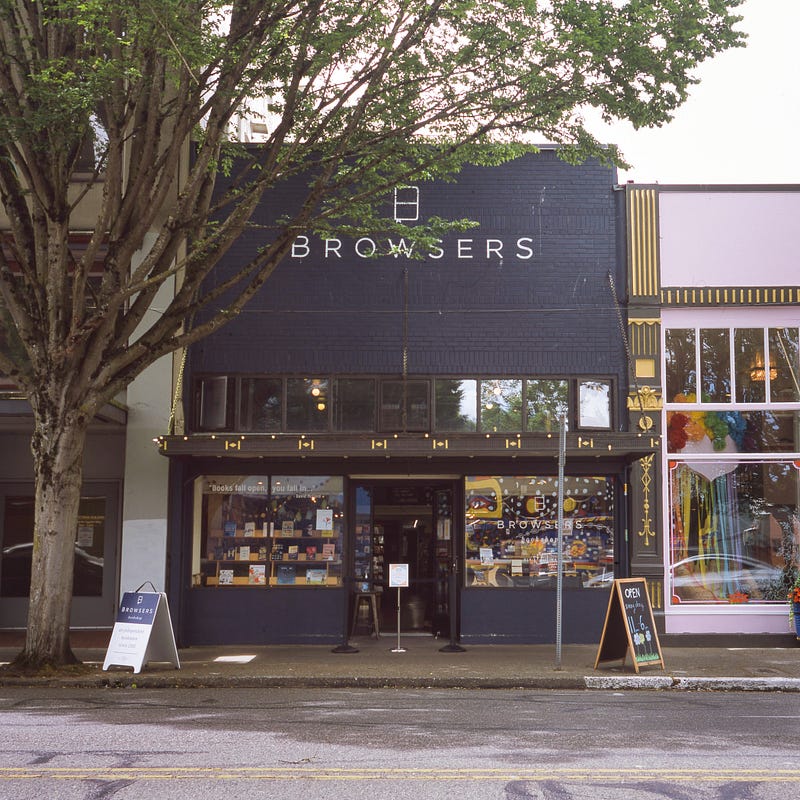
This podcast is a supplement to a story about the history of Browsers, a woman-owned bookshop in downtown Olympia, Washington. Click here to read it!
Podcast by Emily Feek
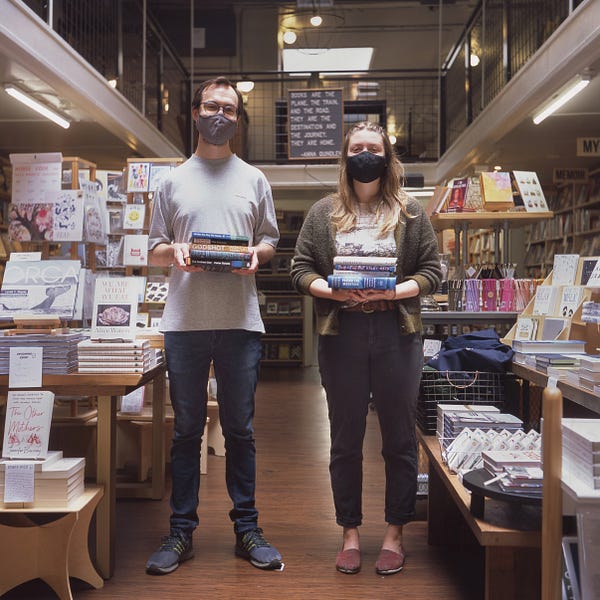
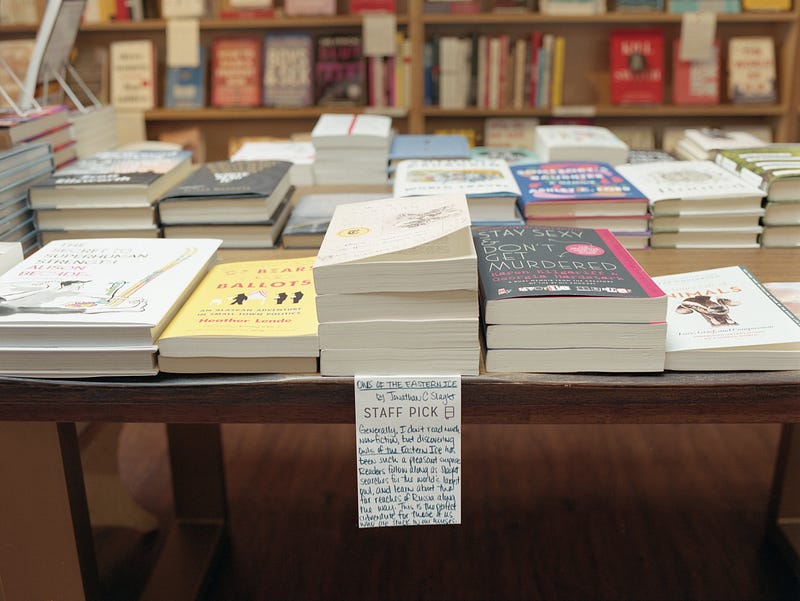
[embed]https://soundcloud.com/klipsun-magazine/between-the-lines-what-its-like-to-own-a-bookshop[/embed]
Podcast Transcript
Emily Feek: Hello, and welcome to Klipsun Out Loud, podcasts from the summer 2021 edition of Western Washington University’s award-winning student magazine, Klipsun. This edition’s theme is Limitless. I’m your host, Emily Feek. Today, we’ll be talking about what it’s like and what you might not expect about running a bookshop’s day-to-day operations. I had the chance to interview Andrea Griffith, the current owner of Browsers, an independent bookshop in downtown Olympia, Washington.
Andrea Griffith: I started Browsers, or I took Browsers over from Jenifer, when we moved here. We moved here in 2010, and I really had one job available to me. I’m a medical librarian. And I got that job, and I have always worked in academics. This was more of a hospital library, and I hated — it was not a good fit. I really was unhappy. So I knew we were going to be in this community for a really long time, and I was just like, “Well, what do I want to do?” And so I ended up just calling Jenifer one day and asked her. I knew who she was, and I knew that she was getting older, and I just asked her if she would consider selling her business to me. And she was like, “Well, maybe we should meet for coffee,” just in her sweet tone of voice. We did, and it just moved along beautifully from that moment. But I just cold-called her one day when I was working from home, and it worked out. Kind of fun.
Emily: So what does running a bookshop entail? What are your responsibilities?
Andrea: My responsibilities are just day-to-day. I manage the staff. I’m here Monday through Friday usually. I work from home on Mondays sometimes. But I’m really responsible for the books that are in the store. I’m the main buyer, so I buy the books, and I buy the sidelines is what we call it in the bookstore world. Anything that’s not a book. So cards, journals, candles. We have stuffed bunnies in the children’s section. All of that type of thing. So, I’m the main buyer for the store. I have some help with the sidelines buying, a little help with the book buying, but I’m the main person. Today I met with one of my Penguin Random House reps to order fall 2020? No, 2021. I’m already planning what we’ll be carrying and how much of it for the holidays, and it is May.
Emily: So I think what you just said ties into the next question, which is how does running a bookshop specifically differ from other types of retail businesses?
Andrea: Right. Well, you know, you think about a gift shop or a clothing store, and a lot of what you’re selling is what is here in the store, right? You go into a gift shop, and you’re not thinking to yourself, “I wish they had this candle in a different flavor. I’m going to ask them.” Some of that happens in a gift shop, but in a bookshop, people are often looking for very specific items that we can honestly get for them. And so we rely on a lot of special orders. It’s an interesting mix to make sure that you’re stocking what people are looking for. Every year at a certain time, we get parents and high schoolers coming in for like, “The Great Gatsby.” So obviously that’s a title that we should always have in stock. I don’t know the school schedule or when they’re reading it, but I want to make sure that we have it, and then if we run out that day or whatever, I can order it for a parent. But we really do want to anticipate what people are looking for. New and classics. That’s really different than most retail places.
Emily: Yeah, and I know you said that margins are different as well?
Andrea: Yeah. Books are kind of a strange beast. You know, our cards and our journals, it’s a 50% margin, straight up. So if something costs $24, I pay $12 for it to put it on our shelves. But books are more like, sometimes between about 40%, 40 to 42 to 44 depending on the publisher and the season and how much I’m ordering. I can get my discount up a little bit, but it is a little different, so it’s not that straight 50% or more that most retail commands. But I also, bookstores, it’s kind of cool, like if we take a chance on a title that a sales rep tells me is going to be really big, and Oprah is going to plug it, or Jenna from Good Morning America is going to plug it, and I buy six copies and no one comes to buy it, I can then send those titles back to the publisher. But of course, I have to pay for the shipping, and then like a restocking fee, so it’s never just like I get a full refund. But you can take chances in a bookstore in a way that straight retail has a harder time doing. They’re stuck with that product if it doesn’t sell.
Emily: So how do you compete with online retailers and sort of, the convenience and often discounts that that offers?
Andrea: On price, we really just don’t compete. I think that’s fair to say. There’s no way, you know. Even what I was telling you about margins, all these school orders that are around me upstairs right now, we offer a 20% discount, which really is about half of my profit on that order. So you hope the order is large enough that you still make enough money, but it takes a lot of time and effort to manage these things. So we just can’t discount as much. We make up for it with sidelines. Hopefully people buy cards, you know, that adds a lot. Or they buy pens, or that type of thing. But also, one thing that we have that Amazon just doesn’t have, or any big online retailer, is we’re a place. You can come, you can see the books in real life before you purchase them. You can talk to a bookseller and get a recommendation. You cannot do that, you cannot talk to a real person on Amazon. We have that place. In times before COVID, and we will do this again, you can come and visit with an author, have your book signed.
Emily: What challenges do you face running a bookshop?
Andrea: Challenges, I’m really lucky in a lot of ways, because Jenifer, the previous owner, owned this building that I’m in, so when we bought the business, we were also able to buy the building. That adds a stability to small business that a lot of people just don’t have. Once that building is paid for, no one will raise my rent, because I own the building. Let’s say — it’s hard to imagine this — but let’s say downtown Olympia just takes off and it’s like, the biggest happening place. Again, hard to imagine sometimes. But if it does, I will never be beholden to a landlord who sees the opportunity to raise rent a lot. Bookstores often just can’t, they’re priced out of their locations because they can’t afford the rent. That won’t happen to me, so that’s one thing I’m grateful for. Other challenges are, finding good staff is always a challenge. Right now though, I’m feeling very positive about that. We have really good people working for us, and the spirit of the store is strong. I feel like we’re attracting good people to work for us, but that’s always — people leave. They come, they invest and then they go and move on, and just maintaining that good spirit is always a challenge. And then, you know, post-COVID there’s just a lot of unanswered questions. When will we be able to do events? When is the right time to bring that back, those are all challenges. Like I told you, I’m ordering for the holidays, and I’m assuming that we will have a more normal holiday season, but who knows? Who knows what’s around the corner. You anticipate these things, but all of that is challenging.
Emily: So, final question.
Andrea: OK.
Emily: You know, to balance out the last one. There are two ways to phrase this. One of those is why do you own a bookstore? And the other one is what makes it worth it? What do you get out of it?
Andrea: I knew this would happen in some ways, but I have been struck with how rewarding owning a business in our downtown has been in terms of just being part of our local community and being involved with all of the different schools in the area, and the teachers in the area. Everything from the yacht club to all these small groups that I get to go and support with book sales. I just feel like we are a vibrant part of downtown Olympia, and that is just really rewarding. It does make a lot of this worth it. Then also, just opening up boxes of books never gets old. It’s like Christmas every day, you know, to see what’s about to come out and what’s coming in. We just get boxes and boxes every day full of wonderful books, and that part is just lovely. Also, when you recommend a book to someone, and they come back and they say how much they loved it. That’s very rewarding. We all love that here, when someone buys one of our staff picks. That’s really exciting.
Emily: What books are you looking forward to that are going to be coming out soon-ish? I know you read a lot of upcoming books.
Andrea: I do. Anthony Doerr, who wrote “All the Light We Cannot See,” is coming out with a book this fall, and I just ordered. I have a copy of that, and I’m going to read it in the next little bit. I’m also excited about Amor Towles, who wrote “A Gentleman in Moscow,” that’s been a huge bestseller. He’s coming out with a book this fall. It’s really fun because right now I’m going through all the catalogs of the publishers in preparation for all of our meetings. And catalogs aren’t physical catalogs anymore. They’re digital. And I’m getting a peek of what’s coming out this fall, and it’s really exciting. Like my favorite cookbook writer is coming out with a baking book, and I didn’t know that until like last night. All of that is just anticipatory and fun. It does make it worthwhile, I feel like.
Emily: And that’s it for this edition of Klipsun Out Loud, podcasts for the summer 2021 edition of Western Washington University’s student magazine, Klipsun. Thanks for listening.
